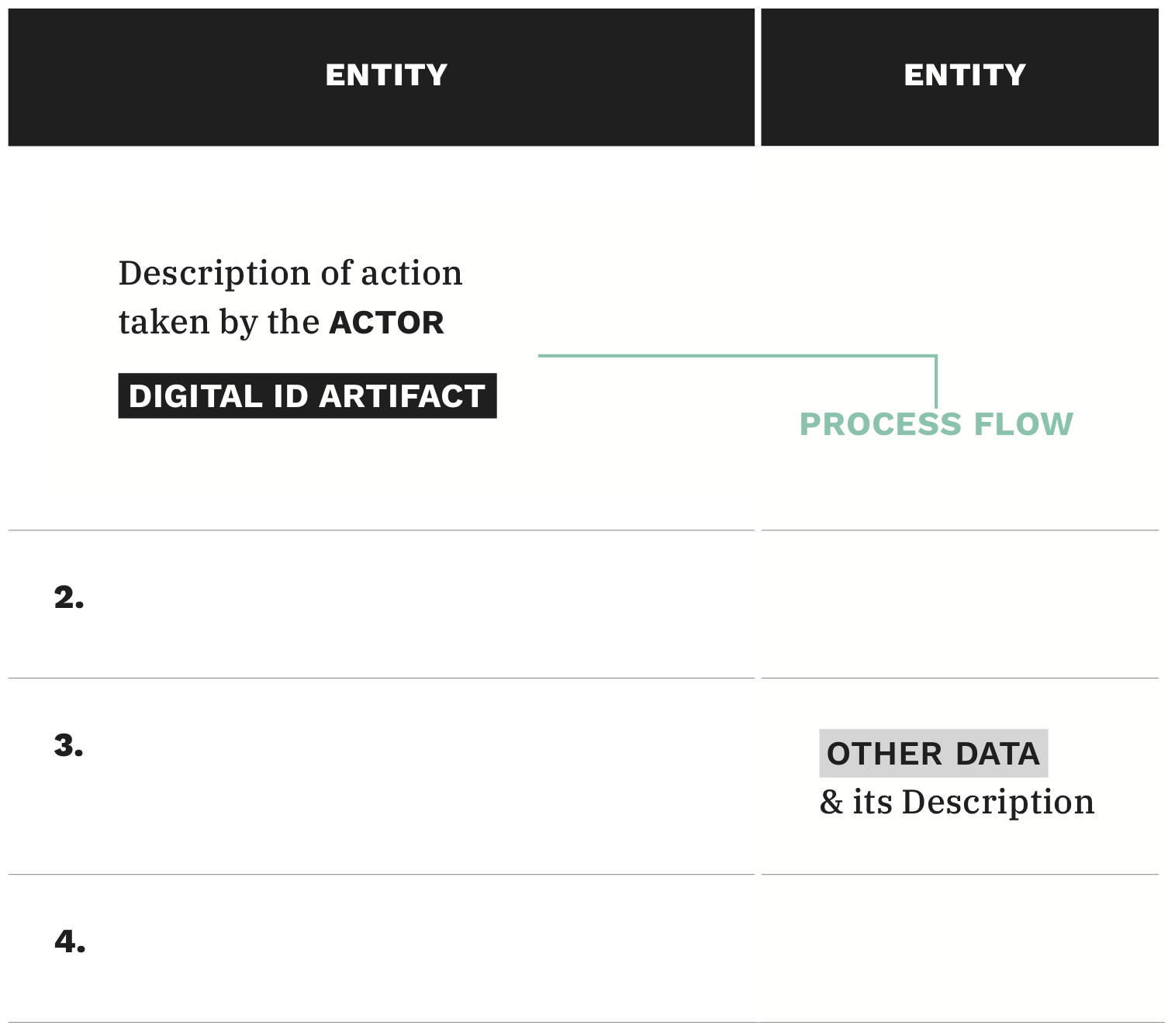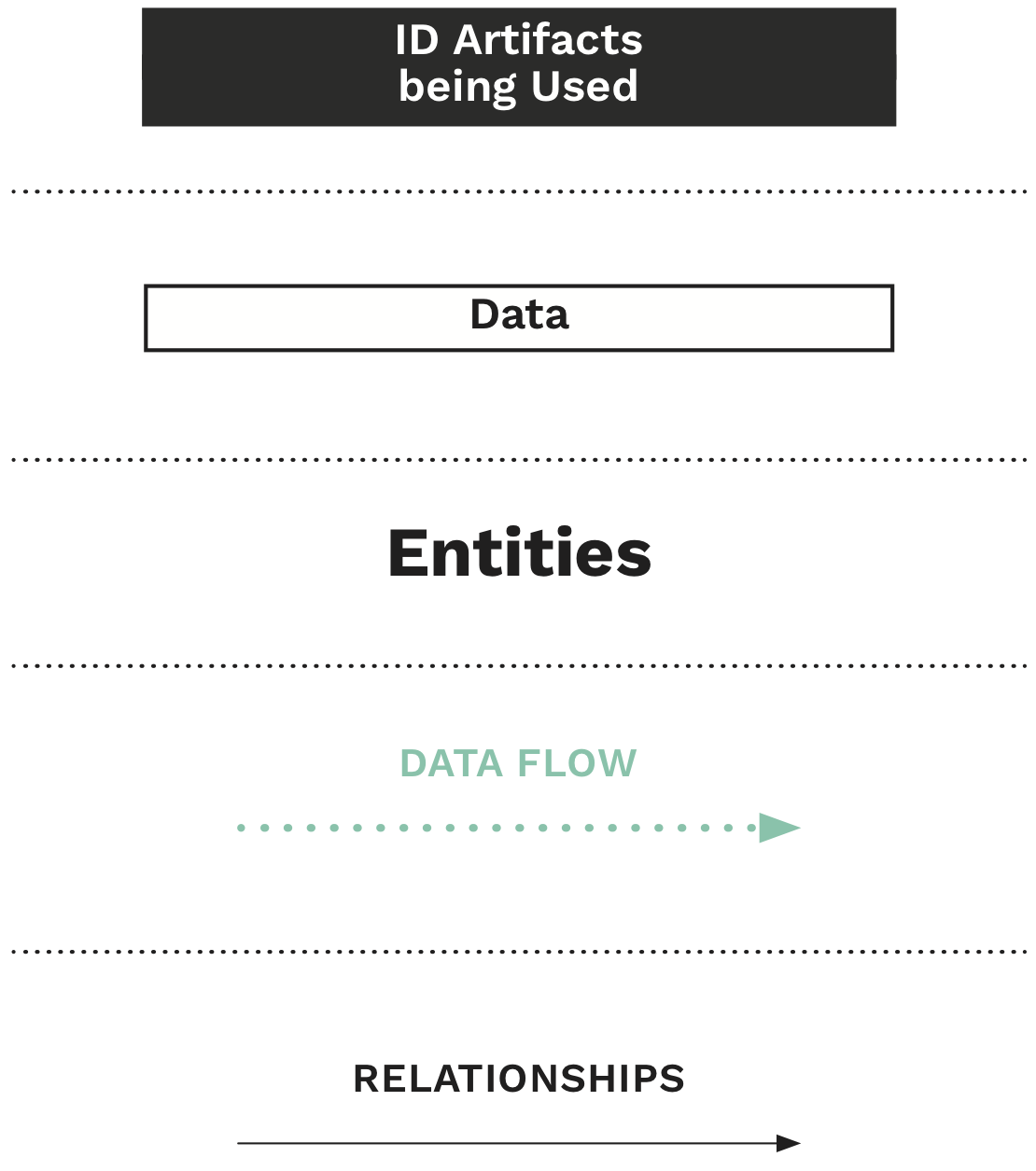Mapping Digital Identity Systems: Nigeria
In this series of exploratory research maps, we examine the digital identity system in Nigeria. This is part of our global survey of digital identity systems. These maps can be read together with our glossary of core concepts and processes. They illustrate the pervasiveness of digital identity, as well as dissect digital identity systems in a way that brings attention to the actions of key stakeholders, and to kinds of data and how they are shared. Designed as stepping stones to further research, the maps facilitate the identification of points of accountability and intervention.
The digital ID system in Nigeria includes the National Identity Number (NIN) and the National Electronic Identity Card (e-ID card). The NIN is a unique eleven digit number, randomly chosen and assigned to an individual at the completion of enrolment into the National Identity Database (NIDB). The NIN can be used to establish or verify the identity of an individual for availing services such as travel, opening bank accounts, and accessing welfare and other relevant services from the Nigerian Government. It is mandatory for every citizen and legal resident to enrol for the NIN. It can be issued to citizens and legal residents of all ages. The e-ID Card however, is issued to citizens and residents who have attained the age of sixteen years and above.
The National e-ID Card is a chip based card with multiple functions, that acts as an additional physical token to the NIN. The NIN can be used on its own for digital identity verification without the e-ID card. But, the e-ID card cannot be used on its own for digital identity verification without the NIN first being stored within its chip. The NIN and the eID Card are both issued by the National Identity Management Commission (NIMC). The NIMC aims to harmonize the data with various agencies across Nigeria in order to make the process of accessing services through the NIN more efficient.
Process Maps
The core processes within each digital identity system are being mapped in order to evaluate the existing technological and policy decisions. These process maps bring forward the advantages and barriers in the mechanisms of identification, authentication, and authorisation. These maps follow the Swim Lane Model to capture these processes. The use of this technique helps to read the processes with clarity, and also points out the multiple possibilities at different steps.
The Swim Lane Model represents a process as a sequence of steps, and places the entities in different lanes (or columns) to show who is responsible for taking those steps. Each column shows the action taken by the respective entity. The numbered rows establish the sequence of steps. The arrows connect the end of each step to the beginning of the next one. Refer to the key on the right to navigate the process maps. They also indicate multiple routes that can be taken within a step. Additionally, these process maps highlight the data being collected and digital identity artifacts being used in various steps.
Identification
National Identity Number (NIN)
The NIN is a unique number issued by the NIMC to individuals after an enrolment process that includes the recording of demographic and biometric information, and digital signature. This data is stored in the National Identity Database, and is linked by the unique NIN. For minors, the process of enrolment is the same, except they must be accompanied by a parent/guardian. The parent/guardian’s NIN Slip must be provided for the process, along with supporting documents. There is no enrollment fee for acquiring the NIN.
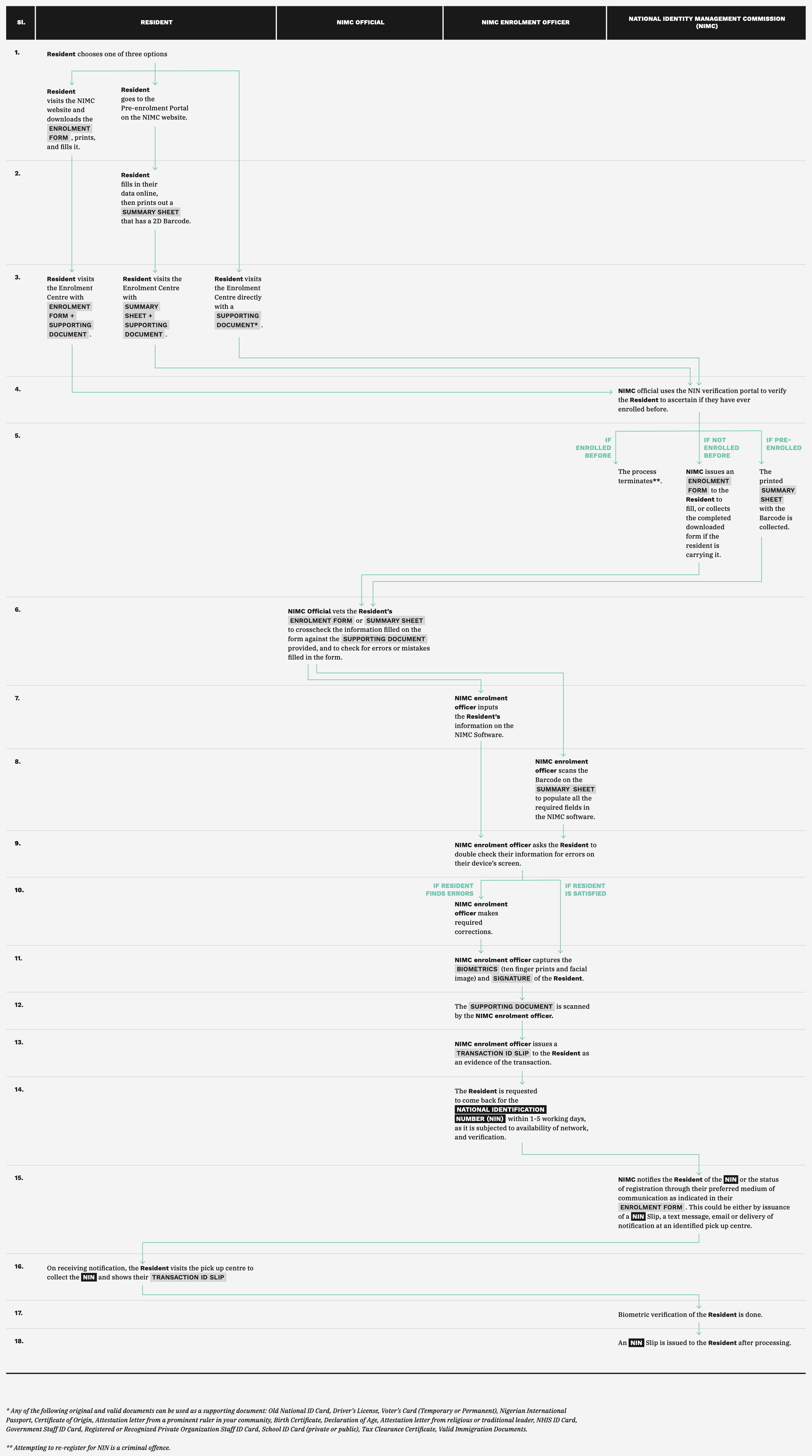
National Electronic Identity Card (e-ID card)
The e-ID Card is issued to the individual within twelve months of receiving the NIN. The NIMC sends a Batch ID to the individual which is used to collect the Card from a NIMC Card Collection Centre. The individual is issued the Card upon successful biometric verification. The applications linked to the Card are also activated after this process. Minors receive an intimation through SMS when they turn sixteen to update their data and obtain their e-ID Card.
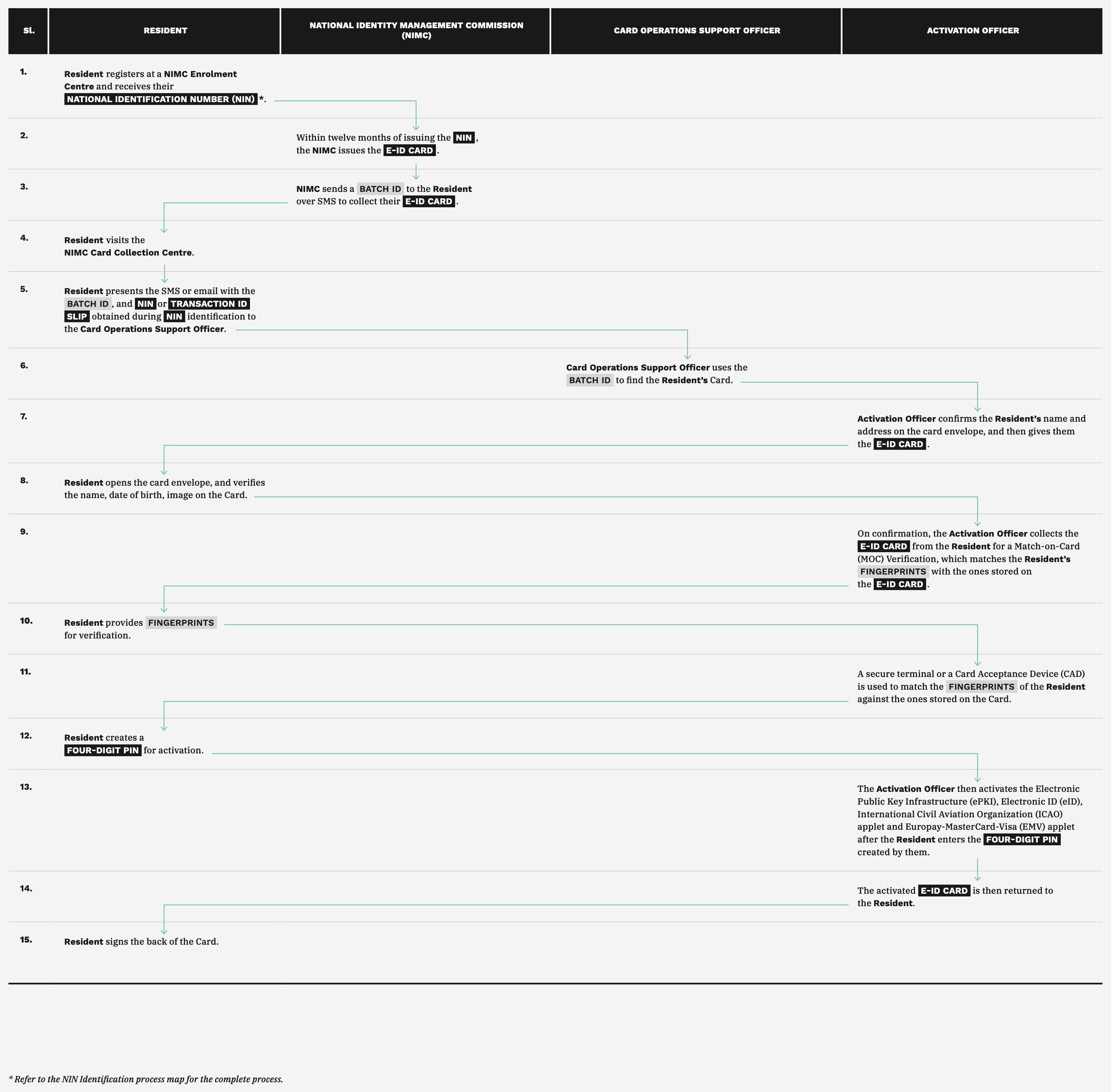
Authentication
National Identity Number (NIN)
The NIN serves as the key unique identity artifact for an ID holder, and can be authenticated either through the use of biometric or demographic information on the NIMC verification service platform, or through the e-ID card. The verification service works as a platform, and allows entities that require verification through NIN to have access to the NIMC database.
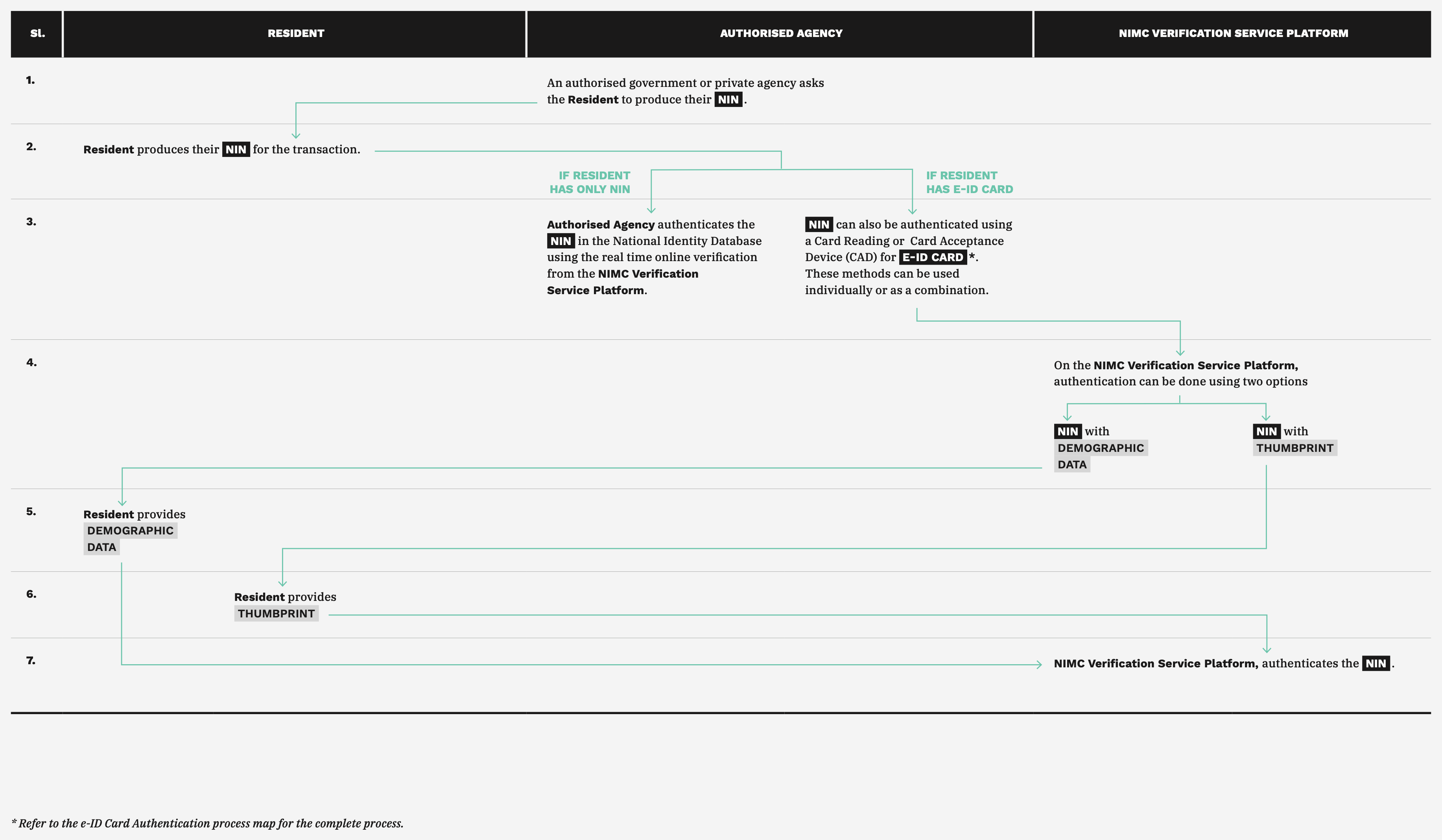
National Electronic Identity Card (e-ID card)
The e-ID Card, through its applications, facilitates access to services offered by the Nigerian government and private institutions. The Card comprises a chip that stores the individual’s NIN and biometric information, the Primary Account Number (PAN) and Card Verification Value (CVV) for MasterCard Payment, and the Machine Readable Zone (MRZ) lines for travel purposes. During authentication, the individual’s biometrics are matched with those stored on the Card. Upon successful verification, the individual can access the desired service.

Systems Maps
As part of the systems thinking approach, sectoral use cases have been mapped to understand how the digital identity system in Nigeria has been conceptualised and implemented. Studying these sectors allows a closer look at the various purposes of the digital identity, and how the individuals, and state and private actors interact with it. The ERAF technique of systems mapping has been used for these maps to give a holistic view of the system and connections within it. It is an analytical tool rather than a representational tool. The ERAF model helps to place the various constituents involved in the system and divides them into entities, relationships, attributes, and flows. This technique of mapping reveals missing connections and flows in a system, and leads to the identification of specific leverage points where a small shift can produce a big impact on the system.
In the ERAF model, entities are the key components. These could be individuals, institutions, laws, places, etc. Relationships describe the way in which different entities are connected to each other. Attributes are characteristics that describe the entities. These could be duration, dimensions, costs, etc. The Flows show the direction of action between entities. This includes transaction of data and resources. Data and its flow within the system, and digital identity artifacts have been highlighted in these maps.
Finance
The payment application on the e-ID Card allows for money to be transferred, paid into, or loaded into the Card. Individuals can use the Card through any of the available payment platforms/options. It can also be used to pay for goods and services such as utility bills, flight tickets, and water bills. The Electronic Identity (e-ID) application can be used as a Know Your Customer (KYC) tool for banks and other financial institutions. The e-Taxation and e-Insurance applications, which are yet to be implemented, will enable the e-ID Card to serve as a self-service tax payment channel, and to administer and renew insurance policies respectively.
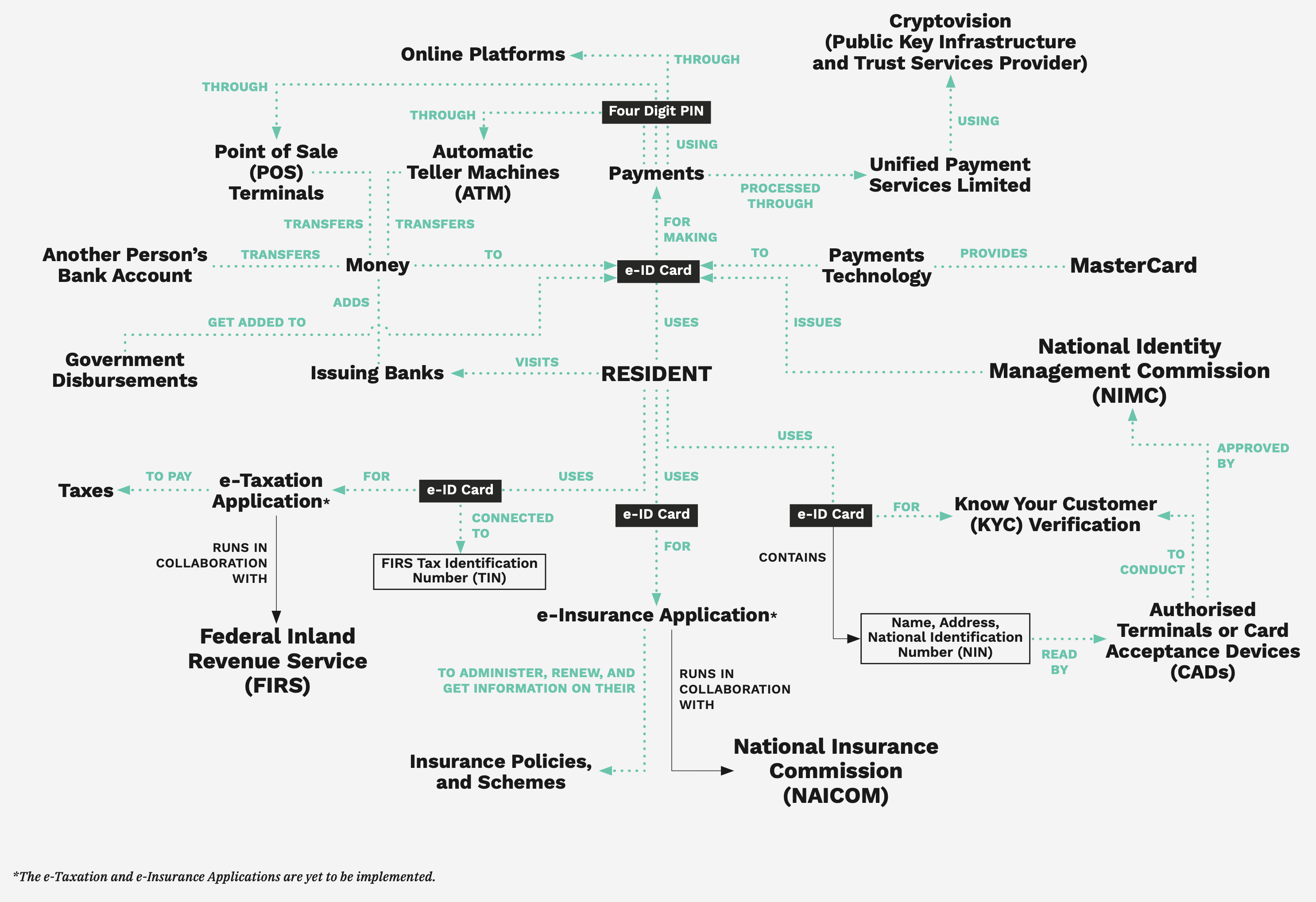
Healthcare
The individuals are required to state their NIN during transactions related to health insurance schemes, and use of health or medical services. The NIN is also used to access the National Health Insurance Scheme (NHIS). Another ID in the healthcare system is the e-Yellow Card. It is issued for people who have been vaccinated against yellow fever. This has come as a replacement to the paper certificates of vaccination. Both Nigerian residents and nationals, and international travellers need to register for a e-Yellow Card through an online portal, and obtain it from the Port Health Services.
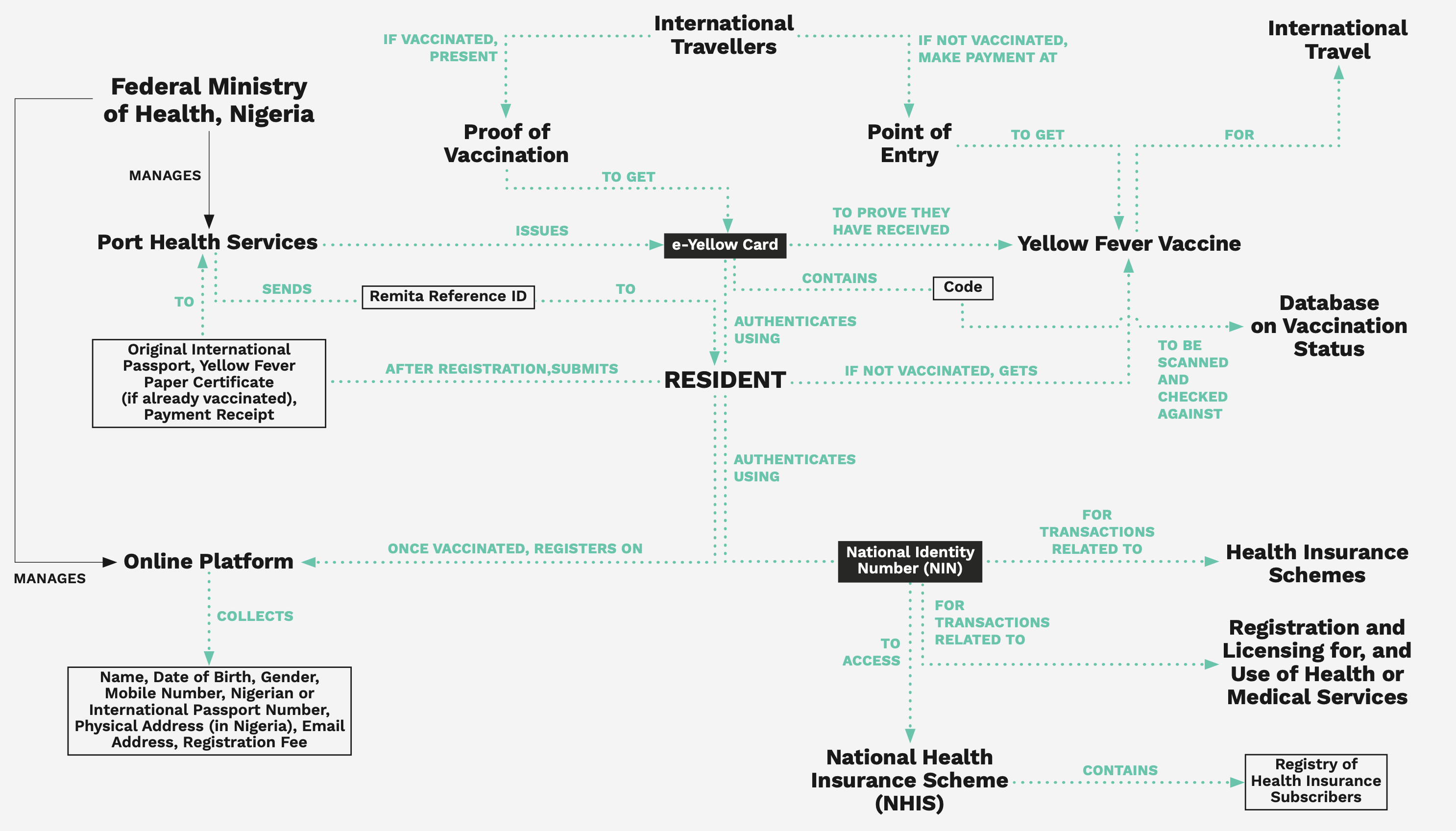
Travel
The e-ID card has a built-in applet that conforms to relevant ICAO standards, and functions as an international passport for select countries that allow travel without visa. It also has an ECOWAS certificate, which allows ID holders to travel to the 16 countries in the ECOWAS sub-region. Another functionality that is yet to be implemented is the e-Transport applet, which would allow ID holders to use their ID card as travel cards comprising a credit-based payment system for public transport.
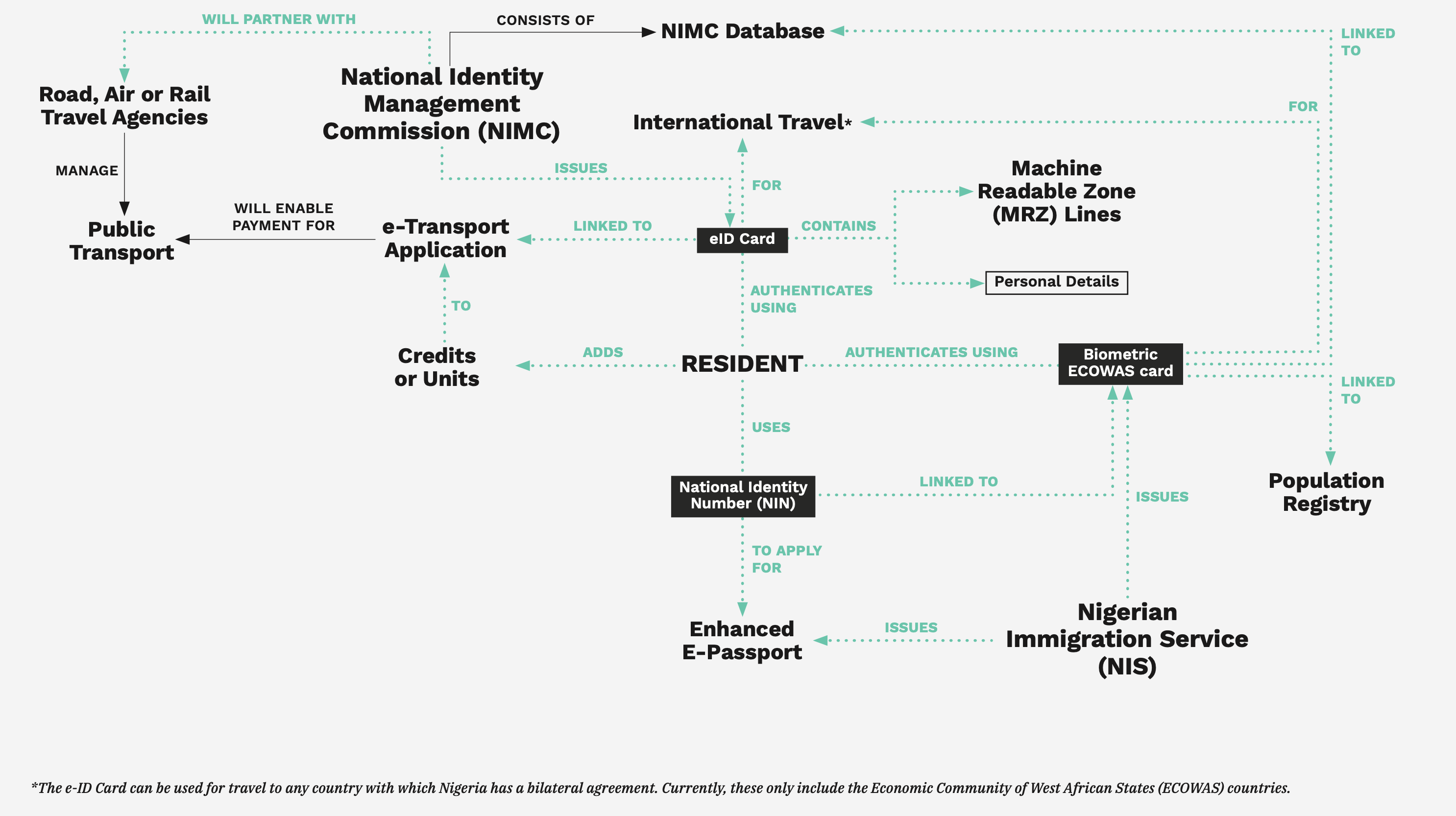
Welfare Schemes
The use of National Identity Number (NIN) in the Nigerian welfare sector is aimed at making the process of accessing the retirement benefits more streamlined. At the time of new registration, all the necessary details of the individual are pulled up by the National Pension Commission (PENCOM) from the National Identity Database (NIDB) electronically so that the individual is not required to re-enter the common details like age, gender, address etc. In case of an existing Resident Savings Account (RSA) the individual can approach PENCOM for updation of their account with e-ID for linking. This, in-turn, maintains a level of cohesion between all the benefits for the individual.
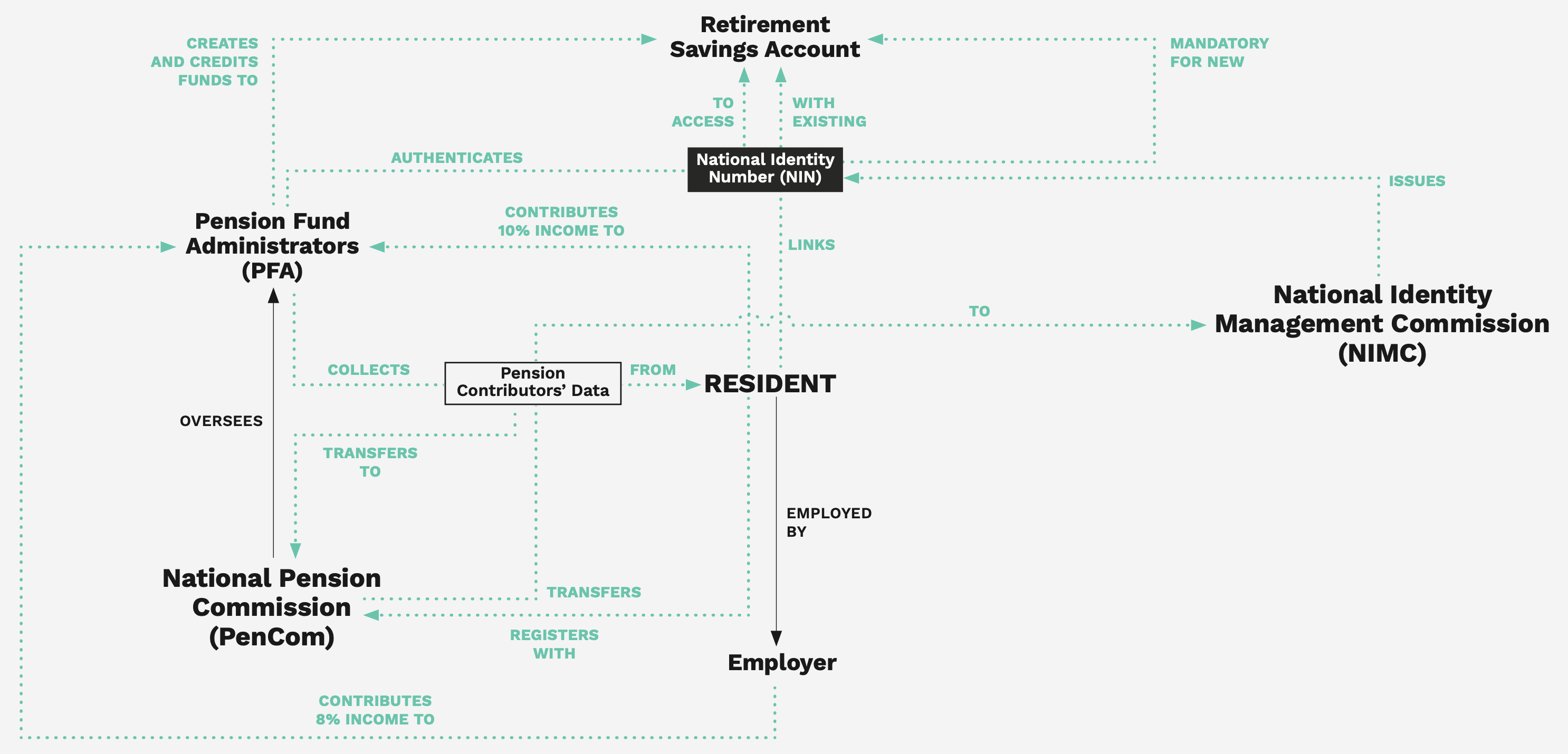
Governance
The NIN is linked to the Nigerian Permanent Voter Card (PVC), which will be authenticated while voting. The existing data that the Nigerian Voting Commission has on the individuals also helped set up the National Identity Database (NIDB). When a new individual is being registered, only the data apart from what was recorded via the NIN is required. The e-ID card will also have an e-Voting application in the future, which will enable it to serve as the individual’s voter card. The e-ID card, however, is not going to replace the PVC, but has rather been designed to complement it.
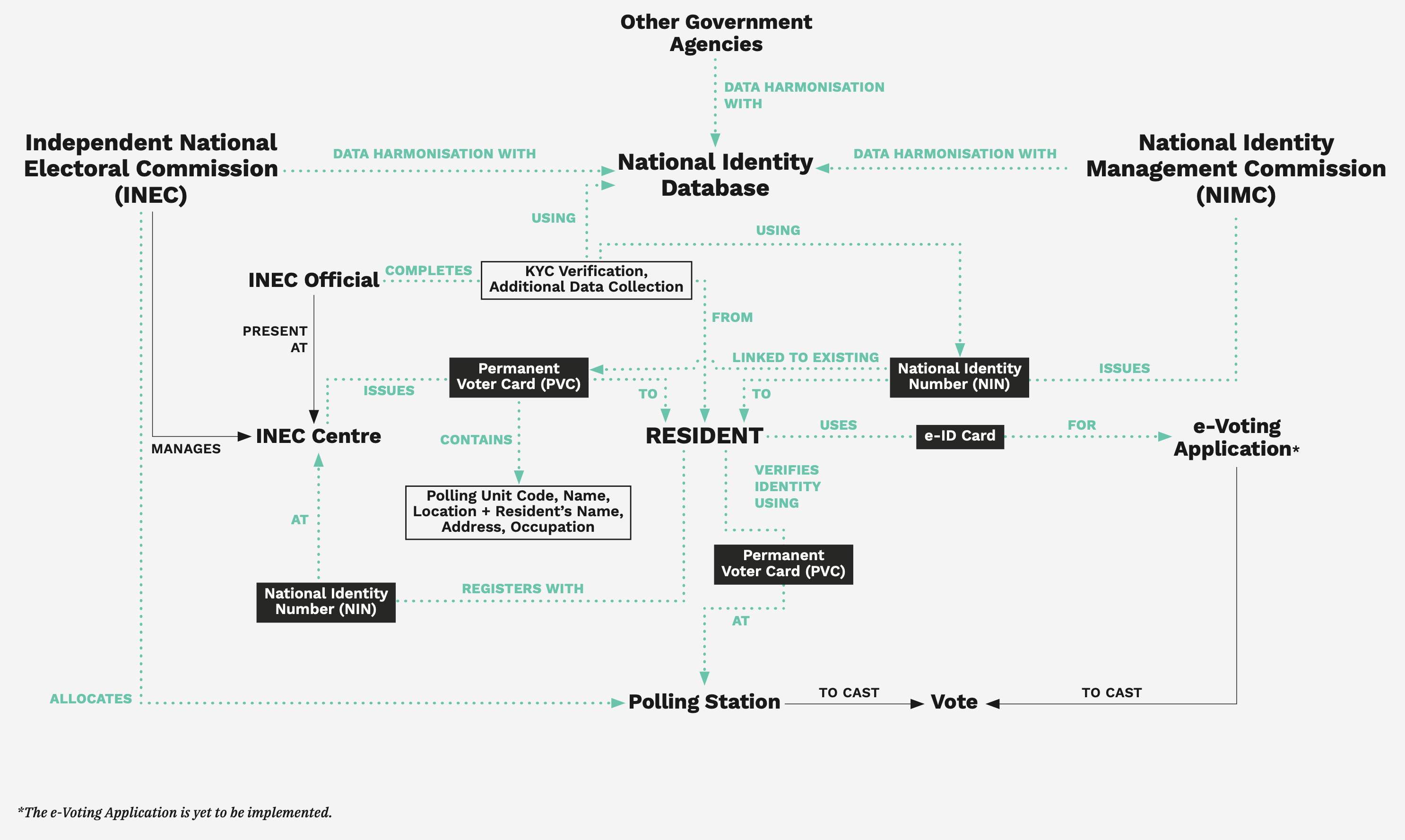
Stakeholders
National IDentity Database (NIDB)
The National Identity Database, an outcome of extensive data harmonization, is a central repository that leverages existing capabilities and enrollment facilities of government agencies, partners, and the private sector in Nigeria to rapidly increase coverage of the National Identification Number (NIN).
National Identity Management Commission (NIMC)
The National Identity Management Commission (NIMC) was established by the NIMC Act No. 23 of 2007. The NIMC has the mandate to establish, own, operate, maintain and manage the National Identity Database in Nigeria. The NIMC does registration, assigns a Unique National Identification Number (NIN) and issues General Multi-Purpose Cards to those who are citizens of Nigeria as well as others legally residing within the country.
MasterCard
Mastercard is a technology company in the global payments industry operating in more than 210 countries and territories. After trying various payment partners the Nigerian government allowed MasterCard to consult on the NIMC program, eventually awarding MasterCard the role of payments partner.
Unified Payment Services Limited
Unified Payments was founded in 1997 by a consortium of Nigerian Banks. Their core businesses comprise processing, merchant acquiring, switching, payment terminal services and provision of value added services & solutions. Unified Payments pioneered the issuance and acceptance of EMV Chip + PIN cards in Nigeria. The company enabled Nigerian banks and merchants for the first time ever to accept foreign cards at Automatic Teller Machines (ATMs) and Points of Sale (POS) terminals, and also pioneered the issuance of Naira cards that are globally accepted.
Cryptovision
Cryptovision is a German company that provides cryptography and solutions for secure electronic identities. Cryptovision is responsible for setting up the Public Key Infrastructure (PKI), which is used for the card itself as well as for the card infrastructure. It includes at least eight certification bodies that issue certificates to more than 100 million cardholders.
Federal Inland Revenue Service (FIRS)
The Federal Inland Revenue Service (FIRS) is the agency responsible for assessing, collecting, and accounting for tax and other revenues accruing to the Federal Government of Nigeria.
National Insurance Commission (NAICOM)
The National Insurance Commission was established in 1997 by the National Insurance Commission Act 1997 with the responsibility for ensuring the effective administration, supervision, regulation, and control of insurance business in Nigeria and protection of insurance policyholders, beneficiaries, and third parties to insurance contracts.
Federal Ministry of Health, Nigeria
The Federal Ministry of Health is one of the Federal Ministries of Nigeria. It is concerned with the development and implementation of policies that strengthen the national health system for effective, efficient, accessible and affordable delivery of health services in partnership with other stakeholders.
Port Health Services
The Port Health Services is a subdivision under the Federal Ministry of Health which oversees international movement of people and goods. Tasked with the reduction of morbidity, mortality, and disability due to communicable and non-communicable diseases at Points of Entry/Exit (POEs).
National Health Insurance Scheme (NHIS)
The National Health Insurance Scheme was established in 1999 by the Federal Government of Nigeria to improve the health of all Nigerians at an affordable cost. The goal of NHIS is to provide social health insurance in Nigeria, where the health care services of contributors are paid from the common pool of funds prepaid and contributed by the participants of the scheme.
Nigerian Immigration Service (NIS)
The Nigeria Immigration Service (NIS) is the government agency that has been charged with the responsibility of migration management in Nigeria. The NIS was extracted from the Nigerian Police Force in 1958 and made into a separate department.
National Pension Commission (PenCom)
The Pension Reform Act 2004 established the National Pension Commission (PenCom) as the body to regulate, supervise and ensure the effective administration of pension matters in Nigeria.
Pension Fund Administrators (PFA)
The Contributory Pension Scheme in Nigeria requires pension funds to be privately managed exclusively by licensed Pension Fund Administrators (PFA). The main functions of the PFA are to open a Retirement Savings Account (RSA) for employees, invest and manage pension fund assets and payment of retirement benefits and accounting for all transactions relating to the pension funds under their management.
Independent National Electoral Commission (INEC)
The Independent National Electoral Commission (INEC) was established by the 1999 Constitution of the Federal Republic of Nigeria to among other things organize elections into various political offices in the country. It oversees not just the elections but also manages everything from auditing and publishing information on political parties and candidates, to promoting knowledge on election processes.
Bibliography
Identification
“How to Enrol (Adults).” National Identity Management Commission. Accessed September 7, 2020. https://www.nimc.gov.ng/how-to-enrol-adults/
“NIMC Verification Service API.” National Identity Management Commission. Accessed September 7, 2020. https://www.nimc.gov.ng/verification-service-api/
Canada: Immigration and Refugee Board of Canada, Nigeria: National Identity Cards, including implementation of the National Identity Card Policy, requirements and procedures, security features, uses, and whether the card is mandatory. (9 October 2015) available at: https://www.refworld.org/docid/56499d642.html. Accessed September 7, 2020.
“About the e-ID Card.” National Identity Management Commission. Accessed July 9, 2020. https://www.nimc.gov.ng/the-e-id-card/
Authentication
“About the NIN.” National Identity Management Commission. Accessed September 7, 2020. https://www.nimc.gov.ng/about-nin/
“How to Enrol (Adults).” National Identity Management Commission. Accessed September 7, 2020. https://www.nimc.gov.ng/how-to-enrol-adults/
“About the e-ID Card.” National Identity Management Commission. Accessed July 9, 2020. https://www.nimc.gov.ng/the-e-id-card/
“e-ID Card Issuance.” National Identity Management Commission. Accessed July 9, 2020. https://www.nimc.gov.ng/eid-card-issuance/
Finance
“About the e-ID Card.” National Identity Management Commission. Accessed July 9, 2020. https://www.nimc.gov.ng/the-e-id-card/
"MasterCard to Power Nigerian Identity Card Program." Global Hub. Accessed June 23, 2020. https://newsroom.mastercard.com/press-releases/mastercard-to-power-nigerian-identity-card-program/
"MasterCard Government Services & Solutions Case Study." Smart Cities Council | Teaming to Build the Cities of the Future. Accessed June 23, 2020. https://smartcitiescouncil.com/system/tdf/public_resources/Nigerian%20National%20ID%20card.pdf?file=1&type=node&id=2069&force=
"About Us." Unified Payments Nigeria - Unified Payments Nigeria. Accessed August 10, 2020. https://up-ng.com/index.php?id=7
"MasterCard to Power Nigerian Identity Card Program." Global Hub. Accessed June 10, 2020. https://newsroom.mastercard.com/press-releases/mastercard-to-power-nigerian-identity-card-program/
Cryptovision. www.cryptovision.com. Accessed August 10, 2020. https://www.cryptovision.com/en/cryptovision-at-the-id4africa-in-nigeria/
Cryptovision. www.cryptovision.com. Accessed August 10, 2020. https://www.cryptovision.com/en/project/federal-republic-of-nigeria-2/
Welfare Schemes
"NIMC, PENCOM Deepen Partnership for National Development." National Identity Management Commission. Accessed June 11, 2020. https://www.nimc.gov.ng/nimc-pencom-deepen-partnership-for-national-development/
"Pension Managers." Pension Managers | Stanbic IBTC Pension Managers. Accessed June 11, 2020. https://www.stanbicibtcpension.com/nigeriapensionmanagers/pension-managers
PensionNigeria. "PenCom Partners NIMC To Fast Track Registration of National Identity Number (NIN) For Retirement Savings Account (RSA) Holders." PensionNigeria – Pension is Your Right. Accessed June 16, 2020. https://www.pensionnigeria.com/pension-news/pencom-partners-nimc-to-fast-track-registration-of-national-identity-number-nin-for-retirement-savings-account-rsa-holders/
Governance
"National ID Won’t Replace INEC Voter Card – NIMC." Punch Newspapers. Last modified April 19, 2016. https://punchng.com/national-id-wont-replace-inec-voter-card-nimc/
"NIMC and INEC Comply with Presidential Directive on Harmonisation of Biometric Data: Set Up JointTechnical Committee." National Identity Management Commission. Accessed July 6, 2020. https://www.nimc.gov.ng/nimc-and-inec-comply-with-presidential-directive-on-harmonisation-of-biometric-data-set-up-jointtechnical-committee/
Yakubu, Prof. Mahmood. "The feasibility of harmonization of National Identity Data and voter register." ID4Africa – Identity for All in Africa. Accessed July 6, 2020. https://www.id4africa.com/2018_event/Presentations/InF12/2-12-1_Nigeria_Prof._Mahmood_Yakubu.pdf
PENCOM. "Functions Of The Commission." National Pension Commission | Regulators of the Nigerian Pension Industry. Accessed July 15, 2020. https://www.pencom.gov.ng/functions-of-the-commission/
Travel
“Enhanced E-Passport.” Nigeria Immigration Service. Last accessed September 7, 2020. https://immigration.gov.ng/enhanced-epassport/
“Nigerian official: Biometric ID card could become passport.” Planet Biometrics. October 6, 2014. https://www.planetbiometrics.com/article-details/i/2252/
“eTransportation applet” About the e-ID Card. National Identity Management Commission. Accessed September 7, 2020. https://www.nimc.gov.ng/the-e-id-card/
Healthcare
“FG Phases Out Old Yellow Card, Replaces with New Electronic Version”. Nigerian Federal Ministry of Health. Last accessed September 7, 2020. https://www.health.gov.ng/index.php?option=com_k2&view=item&id=517:fg-phases-out-old-yellow-card-replaces-with-new-electronic-version&Itemid=490
“Mandatory Use of the National Identification Number Regulations, 2017”. Federal Republic of Nigeria Official Gazette. Last accessed September 7, 2020. https://www.nimc.gov.ng/docs/MandatoryNIN_Gazetted_2017.pdf
“A Strategic Roadmap for Developing Digital Identification in Nigeria, 2017”. National Identity Management Commission. Accessed September 7, 2020. https://www.nimc.gov.ng/docs/reports/strategicRoadmapDigitalID_Nigeria_May2018.pdf
